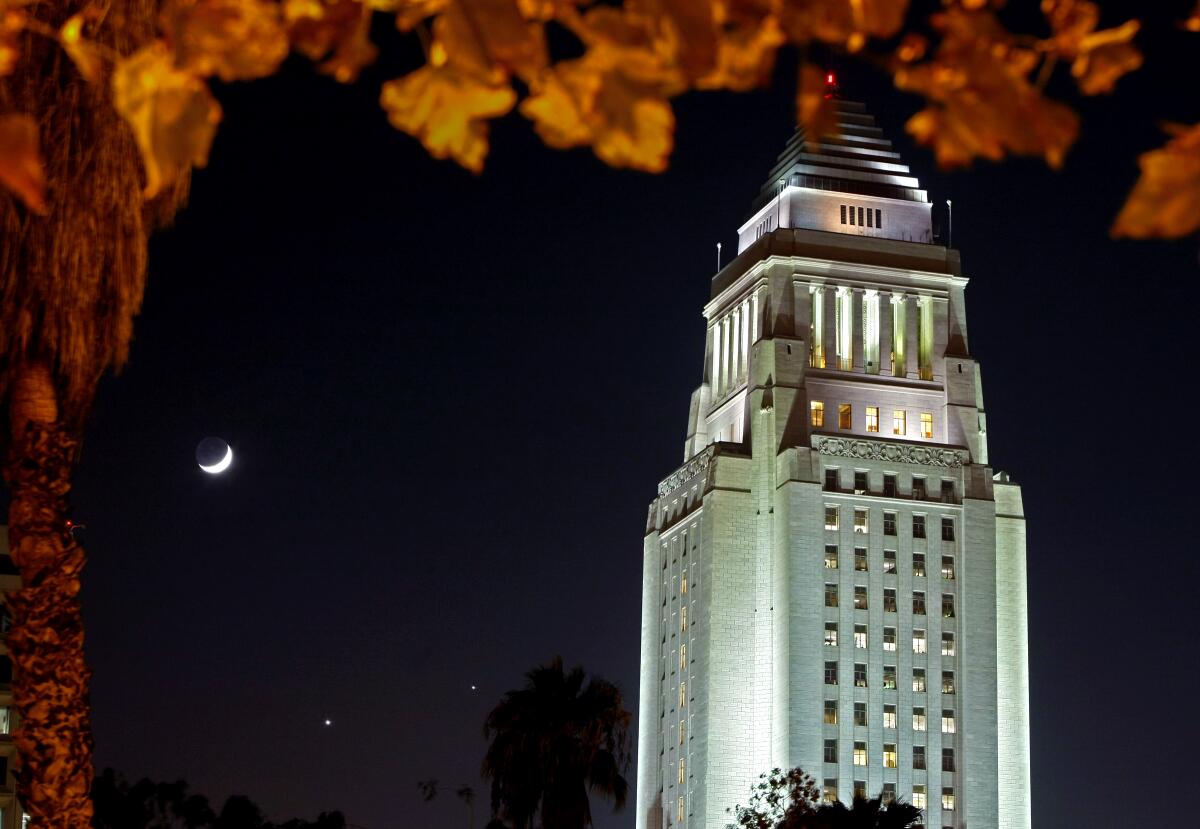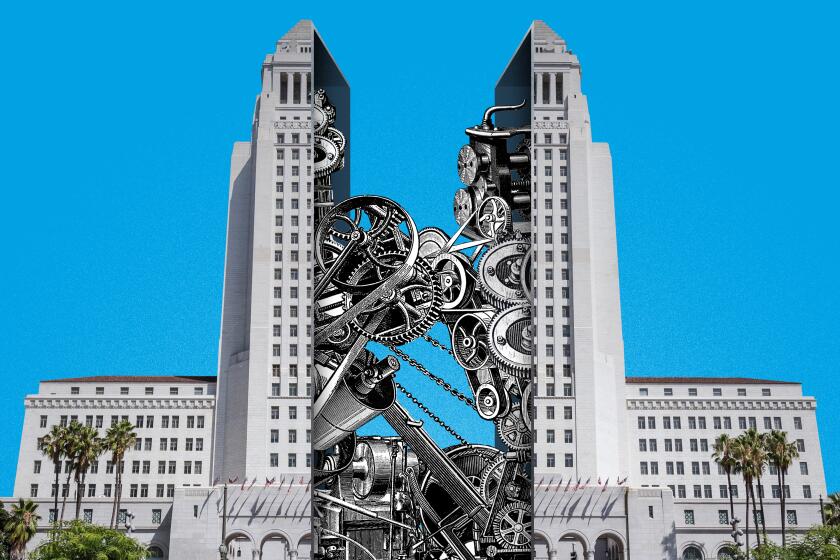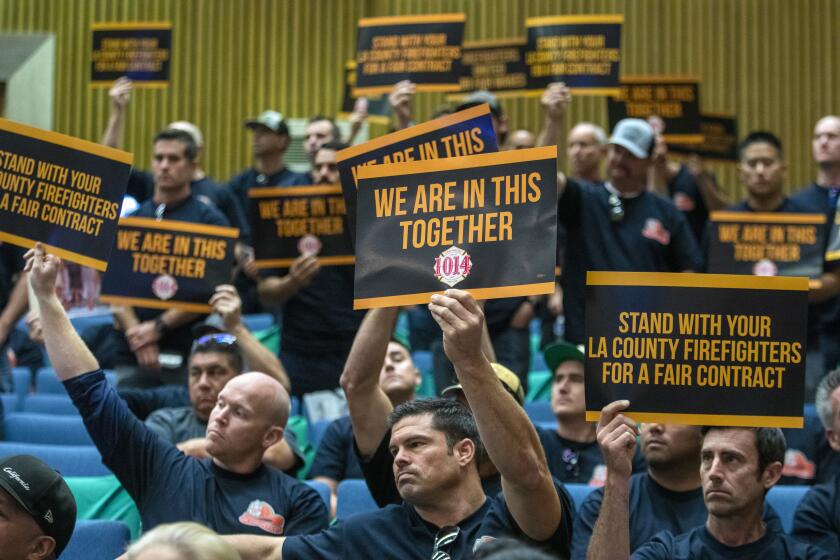Editorial: L.A. is finally cracking down on stealth lobbying

Jamie York, secretary of the Reseda Neighborhood Council, knew something was not right. A representative from a group called Build With Strength had been going to neighborhood councils in 2021 encouraging them to support a ban on wood-frame construction in large apartment complexes and commercial buildings in certain neighborhoods, ostensibly for fire safety protection.
And it wasn’t. York learned that Build With Strength was funded by the concrete industry, which would benefit if builders in Los Angeles had to use concrete in their construction rather than wood. But when she searched neighborhood council meetings where the proposal was put on the agenda and looked at the minutes, she did not see any disclosure from the representative that he was a paid lobbyist working for the National Ready Mixed Concrete Assn.
Later York spoke with other neighborhood council members and found they all had a similar story when a lobbyist had misled them or failed to disclose that they were paid to make an argument. Unfortunately, this practice is legal. City law does not currently require that lobbyists verbally identify themselves and their clients when speaking to neighborhood councils. Unlike City Council members, who have staff and can easily check lobbyist registrations, neighborhood council members are volunteers who may not have the time or savvy to check if speakers at their meetings are advocating for themselves or are paid to speak out.
Los Angeles City Hall has been rocked by scandal after scandal, but now there’s momentum to reform city government.
That would change under a proposed update of the city’s lobbying law, pushed by York and her fellow neighborhood council members, that’s expected to be approved by the City Council this week.
“We’re not City Hall insiders. We don’t know who the big lobbyists are. We’re just regular people who are being asked to weigh in on what we think is best for our communities,” York said. “We’re supposed to listen to our constituents, our stakeholders. But what if they aren’t actually constituents or stakeholders?”
The Municipal Lobbying Ordinance was adopted in 1994 to ensure that city officials and the public would know who is being paid by whom to influence government decisions. But, as the neighborhood council experience shows, the law is now woefully out of date.
The update will require that lobbyists provide verbal disclosures to neighborhood councils. It will also make lobbyists register sooner and require that they disclose what position they’re lobbying for, rather than just the matter they’re lobbying on.
Give credit to political reformers: They’re not about to let a good crisis in City Hall go to waste.
The biggest revision will change the definition of a lobbyist, reversing one passed by voters in an ill-considered 2006 ballot measure developed by the City Council without Ethics Commission input. The measure dictated that someone isn’t officially a lobbyist until they spend 30 hours in three months lobbying. Since nobody is shadowing lobbyists, tallying their minutes of persuasion, this allowed some to avoid registering and made enforcement difficult. The new standard requires registration if a person is entitled to receive at least $5,000 a year for lobbying, which is clearer and easier to enforce.
These are common-sense revisions that match what many other cities require, yet it took a monumental effort. In 2008 and again in 2016 the Ethics Commission tried to modernize the law but the City Council refused to act and the updates died. Why? We don’t know — both times the council refused to even hold a hearing to discuss the update.
Last May the Ethics Commission recommended another proposed update to the lobbying law. And for a while, it looked as if the City Council was going to repeat its dereliction of duty a third time. Months went by and former City Council President Nury Martinez did not set a hearing.
Every dysfunctional government is dysfunctional in its own way. Consider Los Angeles County and L.A. City Hall.
Then, two things happened: Neighborhood council leaders, frustrated by undisclosed lobbying at their meetings, organized a major campaign to pressure city leaders to pass the update. And last fall, City Hall was upended by a leaked recording of Martinez, former Councilmember Gil Cedillo and Councilmember Kevin de León making racist comments, badmouthing constituents and colleagues and scheming for power. Suddenly there was momentum for reform.
Councilmember Nithya Raman carried a motion calling for the lobbying law to be heard and to be made even more stringent. Last week the Ad Hoc Committee on Governance Reform unanimously backed the update and the full City Council is expected to approve the law this week. It’s a long overdue vote.
Of course, it shouldn’t take a scandal or a major community campaign to get L.A. leaders to embrace basic reforms. To prevent future councils from punting on good proposals, the Ethics Commission has recommended going to the ballot with a package of changes that would, among other things, require the City Council to act on — not ignore — the commission’s proposed regulations. The commission also wants the ability to bypass the City Council and put proposed policies on the ballot for voters to decide.
As the saga of the municipal lobbying ordinance shows, ethics reform is far too dependent on the political whims of the city’s elected leaders. It’s time to strengthen the role of the commission and help bolster transparency, accountability and public trust.
More to Read
A cure for the common opinion
Get thought-provoking perspectives with our weekly newsletter.
You may occasionally receive promotional content from the Los Angeles Times.













